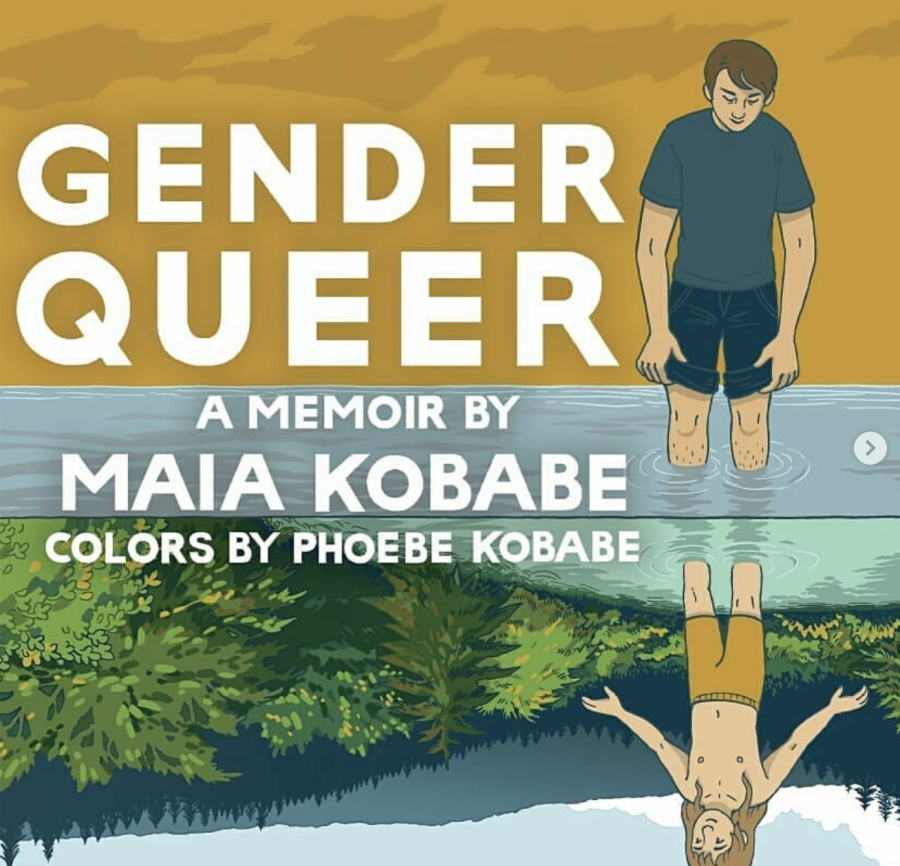Gender Queer is Restricted on Campus
Our community reacts to the restriction of the graphic memoir Gender Queer, by Maia Kobabe, due to parental concerns with the maturity of the book.
@redgoldsparks (Maia Kobabe) on Instagram
Gender Queer explores the journey Maia Kobabe takes when exploring their gender and sexuality. Unfortunately, it has been subject to many book bans.
The graphic memoir Gender Queer, by Maia Kobabe, has recently been restricted in our library, due to a parent complaint in regard to the maturity level of the book. The book is still available, and students may request to read it, but it has been removed from the shelf.
Gender Queer explores Kobabe’s experiences with understanding their gender and sexuality as they developed during adolescence. The memoir does include images of “nude characters and sexual scenarios,” often the subject of bans. Gender Queer is not new to banning or censorship. During this 2021-2022 school year, according to PEN America, Gender Queer is the most banned book, as it is banned in 41 school districts. Book banning is on the rise, and often the books targeted are related to LGBTQ+ content, racism, and/or sexual content.
English teacher Ms. Amy Allen, who teaches two sections of the Banned Books course covers these issues. She expressed that she never thought restriction of books would happen at our school, but she added that “maybe it is inevitable, given our current political climate.” And it is; the Washington Post reported that “Increasingly, organized activist groups are fueling the book-ban movement by challenging the same books — showing up at school board meetings and delivering identical complaints.” Ms. Alisa Brandt, the Library Director, added in an email response, “Parents often cite ‘parental rights’ as one of the reasons for challenging materials because they want to have a say in what their students have access to.” Those who move to challenge books believe they are “protecting” their children.
Ms. Brandt wrote that this complaint and restriction “was more nuanced than a book challenge.” She added that the complaint was due to the fact that the parent was concerned that the “content was too mature and not age appropriate for middle school age students.” Additionally, the parent had communicated that students had taken a picture of a page in the book and shared it with other middle school students. In a letter to the parents, Mr. Ron Kim, Head of School, wrote, “I understand fully that it feels disconcerting and uncomfortable as a parent when your child is reading or consuming media with themes that include sex and sexual identity. Adolescence is a tricky, challenging experience; books and literature can make it easier to navigate…” Additionally, Ms. Brandt explained that the parent was “concerned that their middle school students were seeing content they were not ready for without the guidance of an adult.”
Ms. Brandt said the decision to remove the memoir from the shelf but still make it available to any student who requests it, was made because our library encompasses children from sixth through twelfth grade. “The professional reviews of the book (School Library Journal, YALSA, etc.) rate the book for grades 9 and up.” She also shared that she reached out to the American Library Association’s Office of Intellectual Freedom to ask for their recommendations, and they agreed with the current response.
Many are distressed by the consequences of restricting access to Gender Queer. Ms. Allen shared, “My concern is that requiring students to ask permission to check out the book will stigmatize, and dissuade those who would most benefit from reading it.” Similarly, Lily Gover (‘24), a student taking Banned Books, was upset that the School restricted “access for the kids who might really benefit from it,” and said, “I am really sad that it is being taken away, even if it technically is still available.”
Ms. Brandt understood these consequences, and wrote, “It is the hope of every member of the library staff that every student knows they can ask us for anything they may need and we will handle the request with respect and privacy.” Likewise, Mr. Kim wrote, “Gender Queer examines important topics for our students; we believe that as a community, we are capable of exploring challenging topics without shaming or embarrassing others.”
As of now, Gender Queer will remain available to students who request it. Although this situation is far from ideal, Ms. Brandt added, “I am relieved that we have not been asked to have the book removed from the school entirely.” Book censorship is not new, and this situation forces our community to face it head-on.

Bella Gallus is a senior and the Managing Editor for The Tower. Bella relies on her Spotify playlists, carefully curated for each of her moods, and her...






